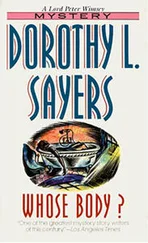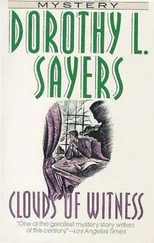Dorothy Sayers - The Nine Tailors
Здесь есть возможность читать онлайн «Dorothy Sayers - The Nine Tailors» весь текст электронной книги совершенно бесплатно (целиком полную версию без сокращений). В некоторых случаях можно слушать аудио, скачать через торрент в формате fb2 и присутствует краткое содержание. Жанр: Классический детектив, на английском языке. Описание произведения, (предисловие) а так же отзывы посетителей доступны на портале библиотеки ЛибКат.
- Название:The Nine Tailors
- Автор:
- Жанр:
- Год:неизвестен
- ISBN:нет данных
- Рейтинг книги:3 / 5. Голосов: 1
-
Избранное:Добавить в избранное
- Отзывы:
-
Ваша оценка:
- 60
- 1
- 2
- 3
- 4
- 5
The Nine Tailors: краткое содержание, описание и аннотация
Предлагаем к чтению аннотацию, описание, краткое содержание или предисловие (зависит от того, что написал сам автор книги «The Nine Tailors»). Если вы не нашли необходимую информацию о книге — напишите в комментариях, мы постараемся отыскать её.
The Nine Tailors — читать онлайн бесплатно полную книгу (весь текст) целиком
Ниже представлен текст книги, разбитый по страницам. Система сохранения места последней прочитанной страницы, позволяет с удобством читать онлайн бесплатно книгу «The Nine Tailors», без необходимости каждый раз заново искать на чём Вы остановились. Поставьте закладку, и сможете в любой момент перейти на страницу, на которой закончили чтение.
Интервал:
Закладка:
Mrs. Venables put down the chicken-pail.
“But what was it all about?”
Emily gulped, and Bunter pointed a tragic finger at a beer-bottle which stood on the kitchen table. “That bottle, madam, was entrusted to me yesterday by his lordship. I placed it in a cupboard in my bedroom, with the intention of photographing it this morning, before despatching it to Scotland Yard. Yesterday evening, it seems that this young woman entered the room during my absence, investigated the cupboard and removed the bottle. Not content with removing it, she dusted it.”
“If you please ’m,” said Emily, “how was I to know it was wanted? A nasty, dirty old thing. I was only a-dusting the room, ’m, and I see this old bottle on the cupboard shelf, and I says to myself, ‘Look at that dusty old bottle, why, however did that get there? It must have got left accidental.’ So I takes it down and when Cook see it she says, ‘Why, whatever have you got there, Emily? That’ll just do,’ she says, ‘to put the methylated.’ So I gives it a dust—”
“And now the finger-prints have all gone,” concluded Bunter in a hollow tone, “and what to say to his lordship I do not know.”
“Oh, dear! oh, dear!” said Mrs. Venables, helplessly. Then she seized on the one point of domestic economy which seemed to call for inquiry. “How did you come to leave your dusting so late?”
“If you please ’m, I don’t know how it was. I got all behind yesterday, somehow, and I said to myself, ‘Better late than never,’ and I’m sure if I’d only have known—”
She wept loudly, and Bunter was touched.
“I am sorry I expressed myself with so much acerbity,” he said, “and I take blame to myself for not removing the key from the cupboard door. But you will understand my feelings, madam, when I think of his lordship innocently waking to a new day, if I may say so, and not knowing of the blow which is in store for him. It goes to my heart, if you will pardon my mentioning the organ in such a connection. There, madam, is his morning tea, only waiting for my hand to put the boiling water to it, and I feel, madam, as though it were the hand of a murderer which no perfumes of Arabia — supposing such to be suitable to my situation — could sweeten. He has rung twice,” added Bunter, in desperate tones, “and he will know by the delay that something of a calamitous nature has occurred—”
“Bunter!”
“My lord!” cried Bunter, in a voice like prayer.
“What the devil has happened to my tea? What the—? Oh, I beg your pardon, Mrs. Venables. Excuse my language and my bath-robe, won’t you? I didn’t know you were here.”
“Oh, Lord Peter!” exclaimed Mrs. Venables, “such a dreadful thing’s happened. Your man is so terribly upset, and this silly girl — she meant well of course and it’s all a mistake — but we’ve dusted all the finger-prints off your bottle!”
“Wah-ha-ha!” sobbed Emily. “O-Oh! Wah-ha-ha! I did it. I dusted it. I didn’t know — ho-ho.”
“Bunter,” said his lordship, “what is the verse about the struck eagle stretched upon the plain, Never through something clouds to soar again? It expresses my feelings exactly. Take up my tea and throw the bottle in the dustbin. What’s done cannot be undone. In any case the finger-prints were probably of no importance. William Morris once wrote a poem called The Man Who Never Laughed Again. If the shout of them that triumph, the song of them that feast, should never again be heard upon my lips, you will know why. My friends will probably be devoutly thankful. Let it be a warning to you never to seek for happiness out of a bottle. Emily, if you cry any more, your young man won’t know you on Sunday. Don’t worry about the bottle, Mrs. Venables — it was a beastly bottle, anyhow, and I always loathed the sight of it. It is a beautiful morning for early rising. Allow me to carry the chicken-pail. I beg you will not give another thought to the bottle, or Emily either. She’s a particularly nice girl, isn’t she? What is her surname, by the way?”
“Holliday,” said Mrs. Venables. “She’s a niece of Russell’s, the undertaker, you know, and some sort of relation to Mary Thoday, though of course everybody is, in this village, related to somebody or the other, I mean. It comes of being such a small place, though now that they all have motor-bicycles and the ’buses running twice a week it isn’t so bad, and there won’t be so many unfortunate creatures like Potty Peake. All the Russells are very nice, superior people.”
“Just so,” said Lord Peter Wimsey. He did a certain amount of thinking as he spooned out mash into the chicken trough.
* * *
He spent the early part of the morning in fresh unavailing study of the cryptogram, and as soon as he thought the pubs would be open, went round to the Red Cow for a pint of beer.
“Bitter, my lord?” inquired Mr. Donnington with his hand upon the tap.
Wimsey said No, not to-day. He would have a bottle of Bass for a change.
Mr. Donnington produced the Bass, observing that his lordship would find it in very nice condition.
“Condition is nine-tenths of the bottle,” said Wimsey, “and a lot of it depends upon the bottling. Who are your bottlers?”
“Griggs of Walbeach,” said Mr. Donnington. “Very sound people they are, too; I’ve got no complaints to make. Just you try for yourself — though you can tell by the look of it, if you see what I mean. Clear as a bell — though, of course, you have to be able to trust your cellarman. I had a chap once that never could be taught not to pack his Bass ’ead down in the basket, same as if it was stout. Now stout will stand being stood on its ’ead, though it’s not a thing I ever would do myself and I don’t recommend it, but Bass must be stood right ways up and not shook about if you’re to do justice to the beer.”
“Very true indeed,” said Wimsey. “There’s certainly nothing wrong with this. Your health. Won’t you take something yourself?”
“Thank you, my lord, I don’t mind if I do. Here’s luck. Now, that,” said Mr. Donnington, raising the glass to the light, “is as nice a glass of Bass as you could wish to see.”
Wimsey asked whether he did much with quart bottles.
“Quarts?” said Mr. Donnington. “No. Not with quarts, I don’t. But I believe Tom Tebbutt down at the Wheatsheaf does a bit. Griggs bottles for him, too.”
“Ah!” said Wimsey.
“Yes. There’s one or two prefers quarts. Though, mind you, most of the business about here is draught. But there’s a farmer here and there as likes the quarts delivered at their homes. Ah! in the old days they all did their own brewing — there’s plenty farms now with the big brewing coppers still standing, and there’s a few as still cures their own sides of bacon — Mr. Ashton’s one on ’em, he won’t have nothing new-fangled. But what with these chain stores and their grocery vans, and the girls all wanting to be off to the pictures in their silk stockings and so many things coming in tins, it’s not many places where you can see a bit of real home-cured. And look at the price of pig-feed. What I say is, the farmers did ought to have some protection. I was brought up a Free Trader myself, but times has changed. I don’t know if you’ve ever thought of these things, my lord. They may not come your way. Or — there — I’m forgetting. Maybe you sit in the ’Ouse of Lords, now. Harry Gotobed will have it that that’s so, but I said as he was mistook — but there I you’ll know better than me about that.”
Wimsey explained that he was not qualified to sit in the House of Lords. Mr. Donnington observed with pleasure that in that case the sexton owed him half a crown, and while he made a note of the fact on the back of an envelope, Wimsey escaped and made his way to the Wheatsheaf.
Читать дальшеИнтервал:
Закладка:
Похожие книги на «The Nine Tailors»
Представляем Вашему вниманию похожие книги на «The Nine Tailors» списком для выбора. Мы отобрали схожую по названию и смыслу литературу в надежде предоставить читателям больше вариантов отыскать новые, интересные, ещё непрочитанные произведения.
Обсуждение, отзывы о книге «The Nine Tailors» и просто собственные мнения читателей. Оставьте ваши комментарии, напишите, что Вы думаете о произведении, его смысле или главных героях. Укажите что конкретно понравилось, а что нет, и почему Вы так считаете.












